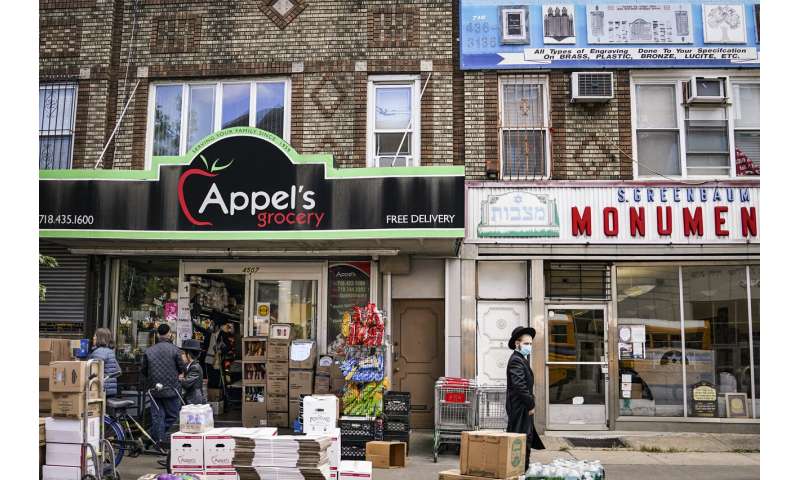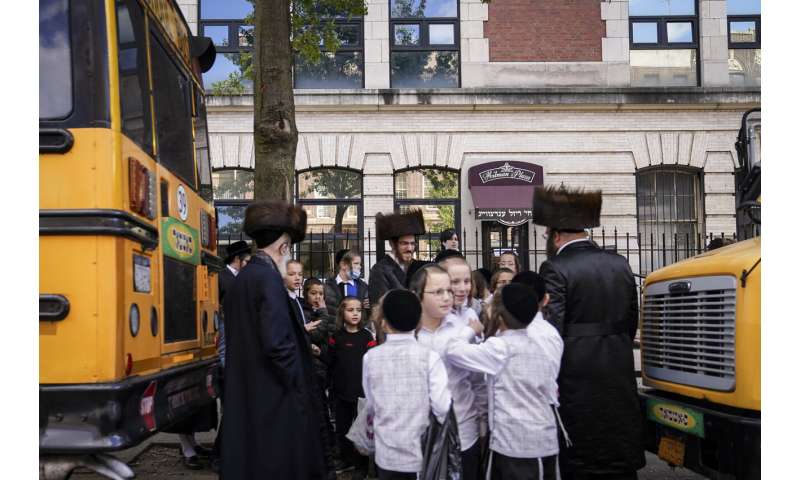

Hundreds of businesses in New York City neighborhoods where COVID-19 cases have spiked were supposed to be closed Thursday by order of the governor, but questions remained about how effectively officials would be able to enforce shutdown rules in areas where they’ve been met with resentment.
In Brooklyn’s Borough Park section, the scene of two nights of protests against the restrictions, some merchants subject to the shutdown order appeared to be operating as usual at midday, including a barber shop, cell phone stores and a toy store.
Mayor Bill de Blasio said 1,200 city workers would be out on the streets Thursday doing enforcement, though some of those efforts involved trying to educate businesses about rules imposed with little warning in hastily drawn zones with confusing borders.
All nonessential businesses in areas designated red zones in parts of Queens and Brooklyn by Gov. Andrew Cuomo were shuttered on Thursday. Houses of worship were ordered to operate with no more than 10 people inside.
Public and private schools were closed within both the red zones and in surrounding areas designated orange zones by the Democratic governor.
The new restrictions involve parts of Brooklyn and Queens in New York City, sections of Orange and Rockland counties in the Hudson Valley and an area within Binghamton, near the Pennsylvania border.
Many of the neighborhoods where restrictions have been imposed are home to large Orthodox Jewish communities, and leaders of those communities have complained of being singled out for enforcement.
De Blasio urged business owners to follow the rules and avoid penalties or fines.
“When we have to bring consequences to bear we will,” he said, “but the first thing we want to achieve is compliance.”
Enforcement appeared to be underway in Brooklyn’s Midwood section, where police had shut down at least two barber shops, including Coney Island Barber.

Owner Adeel Shakoor said business had been slow Thursday morning, with three customers coming in for hair cuts. A police officer came by in the early afternoon, however, and told him to shutter the nonessential business and to monitor the news for updates on when he may reopen.
“It’s really not a good time have a barber shop,” Shakoor said, noting he hasn’t been permitted to offer shaving services for months. “It’s hard to know what’s going to happen.”
In the Borough Park section of Brooklyn, hundreds of men took to the streets Wednesday to protest the restrictions for a second night.
And for the second night, anger boiled over. Videos posted on social media showed a crowd chasing Jewish Insider reporter Jacob Kornbluh down a street and then trapping him against a storefront, where an unmasked local activist screamed in his face. Police officers then intervened and led Kornbluh to safety.
“I was just brutally assaulted, hit in the head, and kicked,” Kornbluh tweeted afterward.
Police say they’re investigating but there were no arrests.
De Blasio called the encounter “disgusting” at a briefing Thursday and promised police would refine their approach to further protests. A night earlier, two people making video recordings of the unrest were also chased by the crowd, with one man needing medical treatment after he was beaten, according to relatives.
A Brooklyn law firm located in one of the restricted zones filed a lawsuit Thursday against Cuomo and de Blasio, saying the localized shutdowns were arbitrary and unlawful.
In its lawsuit, Turturro Law said it was unfair it was being forced to close its offices even though it’s strictly adhered to coronavirus safety measures and isn’t hosting any large gatherings.
Source: Read Full Article